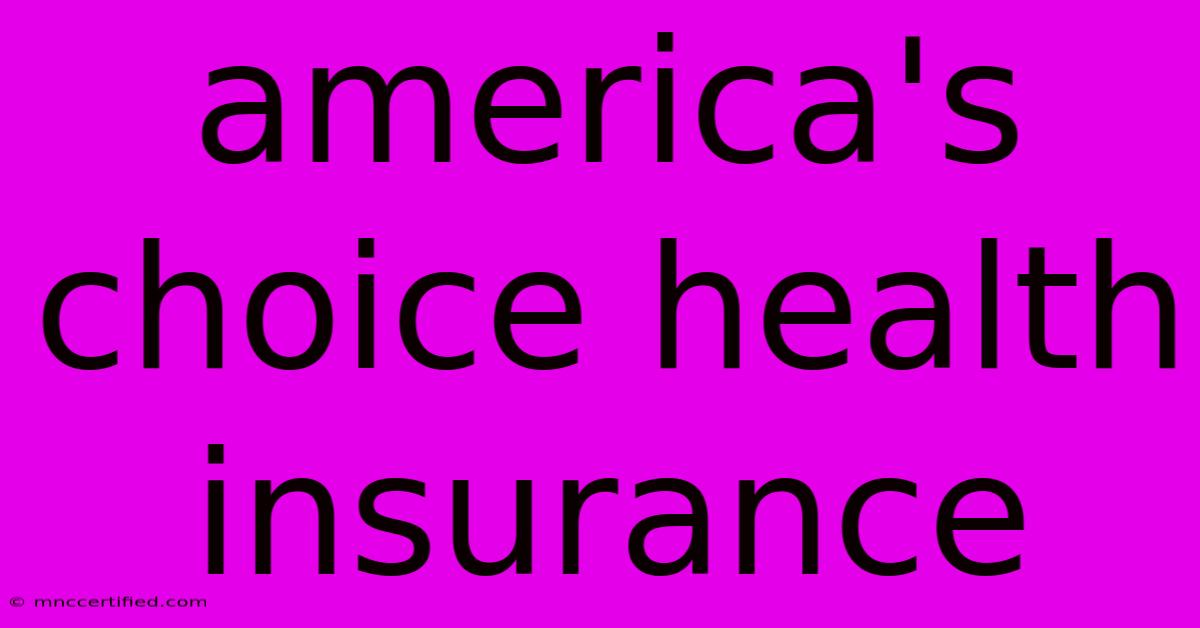America's Choice Health Insurance

Table of Contents
America's Choice Health Insurance: A Comprehensive Guide
Choosing a health insurance plan in the United States can feel overwhelming. With a vast array of options, understanding the nuances of coverage, costs, and provider networks is crucial. This guide delves into America's Choice Health Insurance, exploring its features, benefits, and how it compares to other plans. We'll also cover key considerations to help you make an informed decision about your health insurance needs.
Understanding America's Choice Health Insurance
America's Choice Health Insurance isn't a single, nationwide insurer. The name likely refers to the choice consumers have within the broader American healthcare system. This means navigating different types of plans offered by various insurance providers. These plans typically fall under a few main categories:
1. Health Maintenance Organizations (HMOs):
- How they work: HMOs typically require you to choose a primary care physician (PCP) within their network. Referrals from your PCP are usually needed to see specialists.
- Pros: Often lower premiums, predictable costs.
- Cons: Limited choice of doctors and specialists, may require referrals.
2. Preferred Provider Organizations (PPOs):
- How they work: PPOs offer more flexibility. You can see any doctor or specialist, in-network or out-of-network, but in-network care is significantly cheaper.
- Pros: More choice of doctors, no referrals usually needed.
- Cons: Higher premiums than HMOs, higher out-of-pocket costs for out-of-network care.
3. Point of Service (POS) Plans:
- How they work: POS plans combine features of HMOs and PPOs. You choose a PCP, but you have more flexibility to see out-of-network providers at a higher cost.
- Pros: Balance between cost and choice.
- Cons: Can be complex to navigate.
4. Exclusive Provider Organizations (EPOs):
- How they work: Similar to HMOs, but typically offer slightly broader access to specialists without needing a referral from a PCP. Out-of-network care is generally not covered.
- Pros: Lower premiums than PPOs, more specialist access than HMOs.
- Cons: Limited choice of providers.
5. High Deductible Health Plans (HDHPs):
- How they work: These plans have high deductibles (the amount you pay before insurance kicks in) but lower premiums. They often come with a Health Savings Account (HSA).
- Pros: Lower premiums, tax advantages with HSAs.
- Cons: High out-of-pocket costs before the deductible is met.
Choosing the Right Plan: Key Considerations
Selecting the best health insurance plan depends heavily on individual circumstances. Consider these factors:
- Your budget: Compare premiums, deductibles, co-pays, and out-of-pocket maximums.
- Your health needs: Do you have pre-existing conditions? Do you anticipate needing frequent medical care?
- Your preferred doctors: Check if your preferred doctors and specialists are in the plan's network.
- Your location: Coverage varies by region.
- Prescription drug coverage: Review the formulary (list of covered medications) and associated costs.
Navigating the Marketplace and Finding Resources
The Affordable Care Act (ACA) marketplace (healthcare.gov) is a valuable resource for comparing plans and enrolling in coverage. You can use the marketplace's tools to filter plans based on your needs and budget. Additionally, you can consult with an insurance broker or agent for personalized assistance.
Beyond the Basics: Understanding Key Terminology
Familiarizing yourself with common health insurance terms is crucial for making informed decisions. These include:
- Premium: Your monthly payment for insurance coverage.
- Deductible: The amount you pay out-of-pocket before your insurance coverage begins.
- Copay: A fixed amount you pay for a doctor's visit or other medical service.
- Coinsurance: Your share of the costs of a covered healthcare service, calculated as a percentage (e.g., 20%).
- Out-of-pocket maximum: The most you'll pay out-of-pocket in a year for covered healthcare services.
Conclusion: Making an Informed Decision about Your Health
Choosing the right health insurance plan is a critical financial and health decision. By carefully considering your needs, budget, and the various plan options available, you can make an informed choice that provides adequate coverage and peace of mind. Remember to utilize the resources available, including the ACA marketplace and insurance professionals, to guide your decision-making process. Your health is your wealth, and choosing the right insurance is a key step in protecting it.

Thank you for visiting our website wich cover about America's Choice Health Insurance. We hope the information provided has been useful to you. Feel free to contact us if you have any questions or need further assistance. See you next time and dont miss to bookmark.
Featured Posts
-
Titans Vikings Game Score And Updates
Nov 18, 2024
-
Baltimore Ravens Steelers Game Live
Nov 18, 2024
-
I M A Celeb 2024 Who Is Melvin Odoom
Nov 18, 2024
-
Nfl Live Colts Vs Jets 2024 Online
Nov 18, 2024
-
Can Metal Detectors Detect Copper
Nov 18, 2024